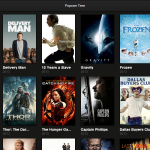Happy Birthday to Me, Happy Birthday to Me, Happy Birthday Dear Webmaster Dude, Happy Birthday to Me (not to the tune of that well known song, as I don’t want to pay royalties). I had to work through my birthday this year, which was no fun. Birthdays are definitely getting less fun as I get older, and the quantity of cake I can have before feeling guilty is also on the decrease. It’s an alarming trend!
News time!
![]()
Google’s common sense submission to the Australian government is likely to fall on deaf years, as the search giant spells out quite clearly that they do not want harsher new copyright laws to try and solve the piracy puzzle. Instead, Google believes that piracy is an issue of availability and pricing that is best solved by investments in innovation, rather than legislation.
The then newly elected conservative government of Australia called on industry submissions for reducing communication regulations, and it was in Google’s submission that the company outlined their believes in regards to piracy.
Unfortunately, the pro big-business government is likely to ignore Google and side with Hollywood, as the country’s Attorney-General has already hinted at the introduction of a three-strikes regime as well as domain blocking via legislation, the type of actions that Google says will yield “little effect”.
What Google says makes a lot of sense. Despite the lack of availability and outrageous pricing here in Australia, which has led to high piracy rates, we are still one of the most eager consumers of digital content in the world. Recent data shows that digital film and TV spending rose 22.4% in the last year. If anything, the high piracy rate may simply be an indicator of huge unmet consumer demand, as hit shows like Game of Thrones are being locked away in exclusive deals that makes it harder and harder for fans to actually download or stream the show legally.
It seems to me that the only way that legislation and technical measures such as DRM and domain blocking can have an effect on piracy, not just in Australian but anywhere, is if it’s succeeds in reducing the enthusiasm people have for TV and movies, or music and games. And I’m not sure this is what rights holders actually want, to have a less enthusiastic customer base. People pirate because they like the content, and it does not mean they won’t pay for it when pricing and availability makes the legal option a viable one. As Google says, it’s not really an enforcement issue (not that you can successfully enforce it anyway, no matter how many laws you pass)
——-
Well, that didn’t last long. Only a few hours after I wrote the original article on Popcorn Time, the BitTorrent powered consumer friendly movie streaming app (being called the Netflix of piracy), the official website has since been closed and the project shuttered. Well, as much as an open source project can be shuttered anyway.
The developers didn’t cite any specific reason (or threats) that was responsible for their decision, but it was pretty clear, reading between the lines and one particular sentence (“legal threats and the shady machinery that makes us feel in danger for doing what we love”), what had occurred.
So what was Popcorn Time? Think of it as the easiest way yet to watch movies online for free. By combining a super sleek user interface, designed specifically for watching movies, and using the power of BitTorrent and a few publicly available APIs, here is, no strike that, “was” an app that made finding movies to stream online easier than using Netflix. Of course, many of these free movies are pirated movies, but Popcorn Time’s simplicity meant that it was no more than a web browser with a BitTorrent client strapped to it.
No surprise then that the legality issue was the biggest one surrounding Popcorn Time in the short period it was actually live. The developers were adamant that it was legal. I mean, how could a web browser and a BitTorrent client not be legal? But then again, The Pirate Bay is just a search engine. And if even a megacorp like Google can get heat for copyright issues, Popcorn Time wasn’t going to be left out of the spotlight. It seems today the criteria for liability relating to inducement or contributory copyright infringement is *anything* that makes piracy a tiny bit easier, even if it was just a heavily customized web browser. This is perhaps why Popcorn Time’s fate was sealed the second it made headlines.
But all is not lost. In their infinite wisdom, the developers of Popcorn Time decided to go open source from the get go. Once something is open source, it can never really be taken down. Given the hype and publicity, and the enthusiasm already shown by the open source community, I fully expect others to build and improve upon what was Popcorn Time.
Popcorn Time and its mascot Pochoclín – we hardly knew ye. But maybe we’ll get to know you better in your new reincarnated form.
This one did last a bit longer though. DVDFab, the company synonymous with DVD and Blu-ray ripping, has met with a major legal setback after a New York federal court ordered its domain names, social media account and funds to be seized and frozen. This comes after AACS LA, the licensing firm responsible for the copy protection schemes found on Blu-ray (and HD DVD – you shall not be forgotten), sued DVDFab, a Chinese company, in the U.S.
The only real surprise was that it took this long for some kind of legal action to be taken, to be fair. DVDFab has since relocated its website to a more hospitable .cn domain, started up a protest site, and offered absolutely zero legal defense of its legal position in the U.S (they did not even respond to the motion for a preliminary injunction, which led to the seizures).
Other companies, including the USTR “notorious piracy list” nominee Aiseesoft, have responded by removing their ripping products. May be too little, a little too late, from a legal perspective though.
Slysoft now leads the DVD and Blu-ray market, if they wasn’t head of the pack before. It too was named in the USTR list, so could legal action soon follow? Who knows.
![]()
The February NPD results have been released. The PS4 was once again the winner, but the winning margin was pretty narrow for February. The PS4 is estimated to have sold around 280K to 286K units, compared to the Xbox One’s 258K.
With Titanfall to be included in March’s NPD results, next month could see the Xbox One regain its next-gen console throne, even if it’s just for one month.
The Wii U managed to sell 82.5K units, behind the Xbox 360’s 114K. No PS3 numbers this time, but you’d expect it to be somewhere between the Wii U’s and Xbox 360’s.
That’s it for this WNR. See you next week.



